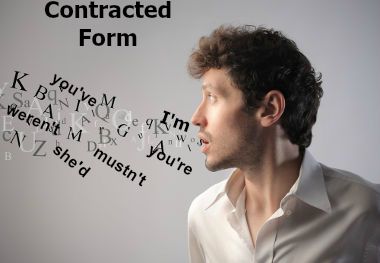Encurtar as palavras ao falar e até mesmo ao escrever é uma prática muito comum no inglês. Geralmente, ao escrever uma palavra que foi contraída, um apóstrofo (') é inserido no lugar onde fica uma letra faltando. Veja alguns exemplos em sentenças:
→ Who's talking? (Who is talking?)
→ I'm going. (I am going.)
→ They haven't seen her. (They have not seen her)
Em inglês, embora as contrações também ocorram na escrita, é na fala que seu uso é mais recorrente. Há, porém, algumas contrações muito utilizadas em ambas as ações (fala e escrita) e que devem, portanto, ser aprendidas.
Demonstraremos cada uma delas separadamente, isto é, as “Positive Contractions”, ou contrações afirmativas, e as “Negative Contractions”, ou contrações negativas.
-
Formas abreviadas na sentença afirmativa
Não pare agora... Tem mais depois da publicidade ;)
Nessa categoria, temos que tomar bastante cuidado ao observar algumas palavras em sua forma contrata. Isso porque algumas contrações podem ter dois ou até mesmo três significados, mas a mesma escrita. É o caso, por exemplo, de “She'd”, que pode ser “she had” ou “she would”. Devemos levar o contexto em consideração para saber de qual dos dois se trata.
Veja alguns exemplos:
→ She'd like to watch! (She would like to watch)
→ She'd finished her homework when I arrived. (She had finished her homework when I arrived.)
Outra contração que também deve ser observada com cuidado é o ('s), pois, além de poder significar “is” ou “has”, ainda pode ser usado com substantivos, nomes, perguntas, entre outros, e não apenas com pronomes, como é comumente ensinado.
Veja alguns exemplos:
→ Nick's arrived.
→ The cab's late.
→ Where's the butter?
→ Here's your place.
→ There's no one like you.
Contracted Form
-
I'm – I've – I'll – I’d
-
You're – you've – you'll – you'd
-
He's – he'll – he'd
-
She's – she'll – she'd
-
It's – It'll
-
We're – we've – we'll – we'd
Não pare agora... Tem mais depois da publicidade ;) -
They're – they've – they'll – they'd
Original Form
-
I am – I have – I will/I shall – I would/I should/I had
-
You are – you have – you will – you had/you would
-
He has/he is – he will – he had/he would
-
She has/she is – she will – she had/she would
Não pare agora... Tem mais depois da publicidade ;) -
It has/it is – it will
-
We are – we have – we will – we had/we would
-
They are – they have – they will – they had/they would
-
Formas abreviadas na sentença negativa
Na forma negativa, há duas maneiras de colocar o verbo “to be” contraído:
→ You aren't - You're not (contraída) = You are not (original)
Em perguntas, “am not” passa para a forma contrata “aren't”, como mostra no exemplo:
→ I'm pretty, aren't I?
Contracted Form
-
Aren't – isn't
-
Can't – couldn’t
-
Didn't – doesn't – don't
Não pare agora... Tem mais depois da publicidade ;) -
Hasn't – haven't – hadn't
-
Mayn't – mightn't – mustn't
-
Needn't – Oughtn't
-
Shan't – shouldn't
-
Wasn't – weren't
-
Won't – wouldn't
Não pare agora... Tem mais depois da publicidade ;)
Original Form
-
Are not – is not
-
Cannot, can not – could not
-
Did not – does not – do not
-
Has not – have not – had not
-
May not – might not – must not
Não pare agora... Tem mais depois da publicidade ;) -
Need not
-
Ought not
-
Shall not – should not
-
Was not – were not
-
Will not – would not
Por Janaína Mourão
Graduada em Letras - Inglês
